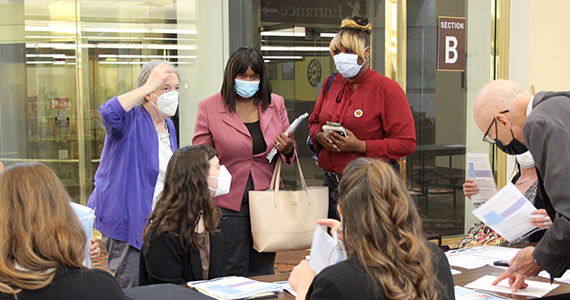Network Members Lobby in Harrisburg to Meet the Need of TANF Participants
 Network members Janet and Renorda with staff of Community Legal Services preparing to meet with lawmakers at the Pennsylvania State Capitol.
Network members Janet and Renorda with staff of Community Legal Services preparing to meet with lawmakers at the Pennsylvania State Capitol.
May 27, 2022
Members of the Center’s Building Wealth and Health Network participated in a statewide collaborative effort to Meet the Need of Pennsylvanians receiving cash assistance from the Temporary Assistance for Needy Families (TANF) program on Monday, May 23. They joined representatives from Philadelphia, Harrisburg, and Pittsburgh at the State Capitol to urge lawmakers to provide much needed support to families by signing on to Pennsylvania House Bill 2012 and Senate Bill 1014.
South Central Pennsylvania Network members Janet Saxbie and Renorda G. joined staff from Community Legal Services, People’s Emergency Center, Just Harvest, and Pennsylvanian Health Access Network to provide their expertise on the importance of TANF and how an increase to the cash grant can make a difference in the lives of families throughout the commonwealth.
The TANF program is the main source of income for 57,000 Pennsylvania children and 19,000 of their caregivers. Cash assistance for a family of three in the state is just $403 per month (21 percent of the federal poverty line), an amount that has not been increased since the program began in 1990. If that amount had increased over time with inflation, families would receive more than $910 per month today. Instead, the purchasing value of the TANF cash grant continues to decrease annually. [Read the Center's brief Pennsylvania Cash Assistance Behind the Times to learn more.]
The 2023 Pennsylvania Executive Budget, proposed by Governor Tom Wolf, includes a $63.8 million cut to the cash grant line item. With caseloads expected to rise in the coming year as more families struggle with the rising cost of living, a cut to this line item could leave the state without the funds to support all eligible families even at the current cash allotment.
Senate Bill 2012 and House Bill 1014 presented by Representatives Malcolm Kenyatta and Katie Muth would implement a gradual, inflation indexed increase to TANF benefits to reach 50 percent of the federal poverty line.
Network members Janet and Renorda know first-hand that the TANF cash grant is an important tool for low-income families to meet their needs and achieve their dreams.

Janet Saxbie has three quickly growing children and has the goal of running her own photography business. But she had to apply for public assistance during the pandemic in order to keep her family safe and cared for. She lost extended family members, and almost lost her brother, due to the virus. The risk to the health of her family and the rising cost childcare made it difficult to earn enough money to meet her family’s needs. With young children quickly outgrowing shoes, it was a challenge to keep them clothed and fed as the cost of everything increases faster than wages.
Reluctantly, she applied for TANF to make sure her children were taken care of while she worked to get her business started from home, but the funds provided by Pennsylvania through TANF and other safety net programs have not been enough to keep up with the needs of her growing children and allow her to make the financial commitment she needs to get her small business off the ground and allow her to be self-sufficient.
Janet acknowledges many people view families receiving cash assistance as just wanting a handout, but she feels it is “a hand up.” She believe TANF should be an opportunity for the community to help people grow and improve - an opportunity she is incredible grateful for, even though it is falling short for her family and many others.

Renorda G. recently move to Pennsylvania from Maryland beause of a domestic situation. It took her a little while to adjust to her new home and create the support she needs for her and her family in Harrisburg. She turned to the TANF program to provide financial assistance during her transition. While she is grateful to have the support of the TANF program during this time, it is not nearly enough to support the needs of her family.
She notes that Pennsylvania’s cash assistance is significantly less than Maryland where she moved from. There, a family of three would receive $727 per month - $313 (80%) more than in Pennsylvania - leaving her and other Pennsylvania families with impossible choices on which bills take priority.
In fact, Delaware, Pennsylvania, and New Jersey have the lowest TANF cash grants in the northeast United States. New Hampshire has the highest cash grant amount in the U.S. ($1,098) while also recording the lowest poverty rate. Eighteen states and Washington D.C. have increased TANF benefit amounts since July 2020. The national average is $482 per month for a family of three.
Renorda often says TANF is a “crutch, not a wheelchair,” in times of need and wants lawmakers to realize that families who need to apply for public assistance don’t want to rely on the programs forever. They want to utilize the program to help them build their financial strength to get back on their feet and be self-sufficient. Unfortunately, the program, as it is structured and supported now, does not help families achieve that goal.

Through participation in TANF, Janet and Renorda became members of the the Building Wealth and Health Network (the Network), a program of Drexel’s Center for Hunger-Free Communities, and now serve as advisors to the Network Advisory Council. The Network is a trauma-informed, healing-centered financial literacy program, that combines emotional and peer support to promote self-efficacy and resilience in traditionally under-resourced communities.
Outside of education on financial topics such as credit reports and understanding financial institutions, The Network discusses the impact of the historical oppression and the individual and collective trauma experienced through policies and programs, such as the public welfare system, in order to support healing. A key component of healing from this often unacknowledged trauma is empowering Network members to engage in advocacy. Research confirms that taking political action has a positive impact on an individuals mental health and motivation.
"In general as Americans, we have been so distanced from our actual rights as citizens," said Alie Huxta, Associate Director of Partnerships and Strategic Planning for the Network. "It is really empowering to know you can speak your truth directly to the source of power. Though it could take years for change or may do nothing policy wise, it changes the way we see our political system."
Renorda described the experience of participating in the Meet the Need lobbying campaign as “monumental.” Before engaging with the campaign, she did not realize that everyday people could just walk in to the Capitol and speak to their representatives.
“Today, we made a difference,” she said. “If nothing else, they will remember something from what we told them.”
Engaging with the legislative staff and sharing her lived experience inspired her to want to do more.
After the trip to the Capitol, she reach out to more of her representatives to urge them to support the TANF program and encouraged other TANF recipients at her local EARN center to do the same.
For Janet, participating in the event was about challenging herself to try something new and forcing herself to get out there and overcome her fears - skills she knows will be important to her as she moves forward in growing her business.
“I am so happy I said yes to doing this,” she said. “I have anxiety talking in front of groups but with the support of the group by the end of the experience I felt so good. I am grateful the opportunity was presented to me."